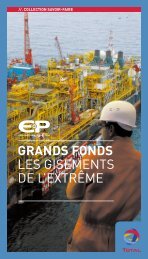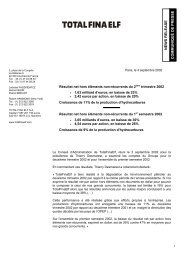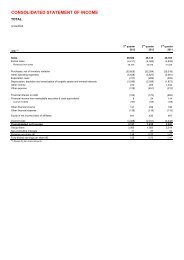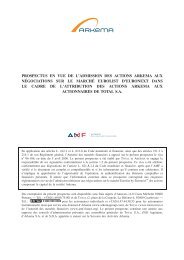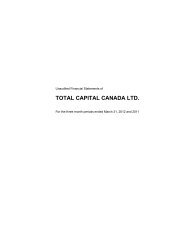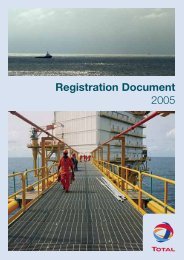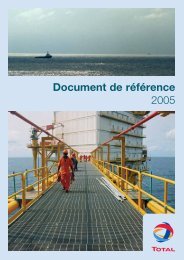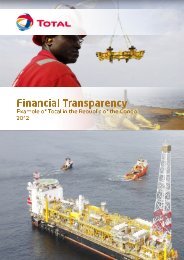Registration document 2007 - Total.com
Registration document 2007 - Total.com
Registration document 2007 - Total.com
Create successful ePaper yourself
Turn your PDF publications into a flip-book with our unique Google optimized e-Paper software.
9<br />
differences resulting from such translations are either recorded in<br />
Shareholders’ equity under “Cumulative translation adjustments”<br />
(for the Group share) or under “Minority interests” as deemed<br />
appropriate.<br />
D. Sales and revenues from sales<br />
Revenues from sales are recognized when the significant risks<br />
and rewards of ownership have been passed to the buyer and<br />
the amount can be reasonably measured. Sales figures include<br />
excise taxes collected by the Group within the course of its oil<br />
distribution operations. Excise taxes are deducted from sales in<br />
order to obtain the “Revenue from sales” indicator.<br />
Revenues from sales of crude oil, natural gas and coal are<br />
recorded upon transfer of title, according to the terms of the<br />
sales contracts.<br />
Revenues from the production of natural gas properties, in which<br />
the Group has an interest with other producers, are recognized<br />
based on actual volumes sold during the period. Any difference<br />
between volumes sold and entitlement volumes, based on the<br />
Group net working interest, which are deemed to be nonrecoverable<br />
through remaining production, are recognized as<br />
accounts receivable or accounts payable, as appropriate.<br />
Revenues from gas transport are recognized when the services<br />
are rendered, based on the quantities transported and measured<br />
according to procedures defined in each service contract.<br />
Revenues from sales of electricity, to the Downstream and<br />
Chemicals segments, are recorded upon transfer of title,<br />
according to the terms of the related contracts.<br />
Revenues from services are recognized when the services have<br />
been rendered.<br />
Shipping revenues and expenses from charters activities are<br />
recognized on a pro rata basis over a period that <strong>com</strong>mences<br />
upon the unloading of the previous voyage and terminates upon<br />
the unloading of the current voyage. Shipping revenue<br />
recognition starts only when a charter has been agreed to by<br />
both the Group and the customer, and revenue begins to be<br />
earned.<br />
Oil and gas sales are inclusive of quantities delivered that<br />
represent production royalties and taxes when paid in cash and<br />
outside the USA and Canada.<br />
Certain transactions within the trading activities (contracts<br />
involving quantities that are purchased outside the Group then<br />
resold outside the Group) are shown at their net value in sales.<br />
Exchanges of crude oil and petroleum products within normal<br />
trading activities do not generate any in<strong>com</strong>e: flows are shown at<br />
their net value in both the in<strong>com</strong>e statement and the balance<br />
sheet.<br />
174<br />
Appendix 1 – Consolidated financial statements<br />
Notes to the consolidated financial statement<br />
TOTAL – <strong>Registration</strong> Document 2006<br />
E. Share-based payments<br />
The Group may grant employees stock options, have employee<br />
share purchase plans and may offer its employees the<br />
opportunity to subscribe to reserved capital increase. These<br />
employees benefits are recognized as expenses with a<br />
corresponding credit to shareholders’ equity.<br />
The expense is determined at fair value by reference to the<br />
instruments granted. The fair value of the options is calculated<br />
using the Black & Scholes method at the grant date. The<br />
expense is allocated on a straight-line basis between the grant<br />
date and vesting date.<br />
The cost of employee-reserved capital increases is immediately<br />
expensed. A discount reduces the expense in order to take into<br />
account the non-transferability of the shares awarded to the<br />
employees over a period of five years.<br />
F. In<strong>com</strong>e taxes<br />
In<strong>com</strong>e taxes disclosed in the in<strong>com</strong>e statement include the<br />
current tax expenses (in<strong>com</strong>e) and the deferred tax expenses<br />
(in<strong>com</strong>e).<br />
The Group uses the liability method whereby deferred in<strong>com</strong>e<br />
taxes are recorded based upon the temporary differences<br />
between the financial statement and tax basis of assets and<br />
liabilities, and for carry forwards of unused tax losses and tax<br />
credits.<br />
Deferred tax assets and liabilities are measured using the tax<br />
rates that have been enacted or substantially enacted at the<br />
balance sheet date. The tax rates used depend on the maturity<br />
of renewal of temporary differences, tax losses and other tax<br />
credits. The effect of the change in tax rate is recognized either in<br />
the consolidated statement of in<strong>com</strong>e or in equity depending on<br />
the item it is related to.<br />
Deferred tax assets are recognized when future recovery is<br />
probable.<br />
Asset retirement obligations and finance leases give rise to the<br />
recognition of assets and liabilities for accounting purposes as<br />
described in note 1Q “Asset retirement obligations” and 1K<br />
“Leases” to the consolidated financial statements. Deferred<br />
in<strong>com</strong>e taxes on temporary differences resulting from the<br />
difference between the carrying value and taxable basis of such<br />
assets and liabilities are recognized.<br />
Deferred tax liabilities on temporary differences resulting from the<br />
difference between the carrying value of the equity-method<br />
investments and the taxable basis of these investments are<br />
recognized. The deferred tax calculation is based on the<br />
expected future tax effect (dividend distribution rate or tax rate on<br />
the gain or loss upon sale of these investments).<br />
Taxes paid on the Upstream production are included in operating<br />
expenses, including those related to historical concessions held<br />
by the Group in the Middle East producing countries.




